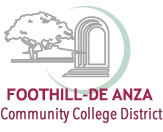Board of Trustees
The Foothill-De Anza Community College District is governed by a locally elected, five-member board. Board members serve four-year terms and are elected by trustee areas in even-numbered years, with three members chosen at one election and two members at the other. The President and Vice President of the Board of Trustees are elected by the governing board for one-year terms at the annual organizational meeting in December. Two student trustees, one from each college, are elected by the student body annually and serve a term from June 1 through May 31 each year.
Board Meetings
The Board generally meets the first Monday of each month with public session commencing at 6:00 p.m. in the District Office Building (D700) on the Foothill College campus, 12345 El Monte Road, Los Altos Hills, in the Board Room (Room 101). A calendar of meetings is available online at the Board's eGovernance site, but it is important to check the posted agenda for actual meeting times and locations. Periodically, the Board holds study sessions to allow deeper discussions of key issues. In addition, the Board may occasionally call special or emergency meetings as needed.
Public records related to open session agenda items are available for inspection online at https://www.boarddocs.com/ca/fhda/Board.nsf/Public.
Meeting Agendas
Board of Trustees meeting agendas are posted for public review at least 72 hours prior
to each regular meeting and 24 hours prior to each special meeting on the Foothill
College campus outside the Board Room (Building D700, Room 101).
Meeting agendas and background materials are also available online at least 72 hours
prior to each regular meeting at the Board's eGovernance site. Background materials for various agenda items are available by clicking on the attachment
link in the agenda document. Contact the Chancellor's Office at 650-949-6100 regarding
any background material that is not included.
For information or disability access to agenda materials, contact the Chancellor's Office at 650-949-6100 or maitlandcarla@fhda.edu. Accommodation requests should be made no later than one business day prior to the meeting. Board of Trustees meetings are held in a location accessible to the disabled.
Public Participation
Regular meetings of the Board of Trustees include opportunities for members of the public to address the Board regarding agenda and non-agenda items. Comments at special and emergency meetings are limited to agenda items. Members of the public who wish to address the Board regarding regular meeting agenda items or items not on the agenda are encouraged to submit comments in advance to maitlandcarla@fhda.edu. Please state "Public comment for Board meeting" in the subject line of the email message. Comments are limited to five minutes per person, and written comments should not exceed 750 words in order to comply with the time limit. Pursuant to board policy, the Board President may limit the total number of speakers addressing a particular subject and/or reduce the minutes allowed per person below five minutes. Written comments received by the time specified on the meeting agenda on the date of the regular meeting will be distributed to trustees and posted to the public agenda. Members of the public who attend the meeting in person may submit a request form available at the meeting location to ask to address the governing board regarding agenda or non-agenda items.
Board Priorities
The Board of Trustees adopts priorities annually to help guide the district. Board priorities are generally set for the new academic year during the August meeting.
Fair Political Practices Commission Form 802
Fair Political Practices Commission Form 802 (See Administrative Procedure 2714)
Fair Political Practices Commission (FPPC) Regulation 18944.1 sets out the circumstances under which an agency’s distribution of tickets to entertainment events, sporting events, and like occasions would not result in a gift to individuals that attend the function. The Form 802 serves to detail each event and the public purpose of each ticket distribution and also informs the public as to whether the admissions were made at the behest of an agency official and whether the tickets were provided to an organization or to specific individuals.
